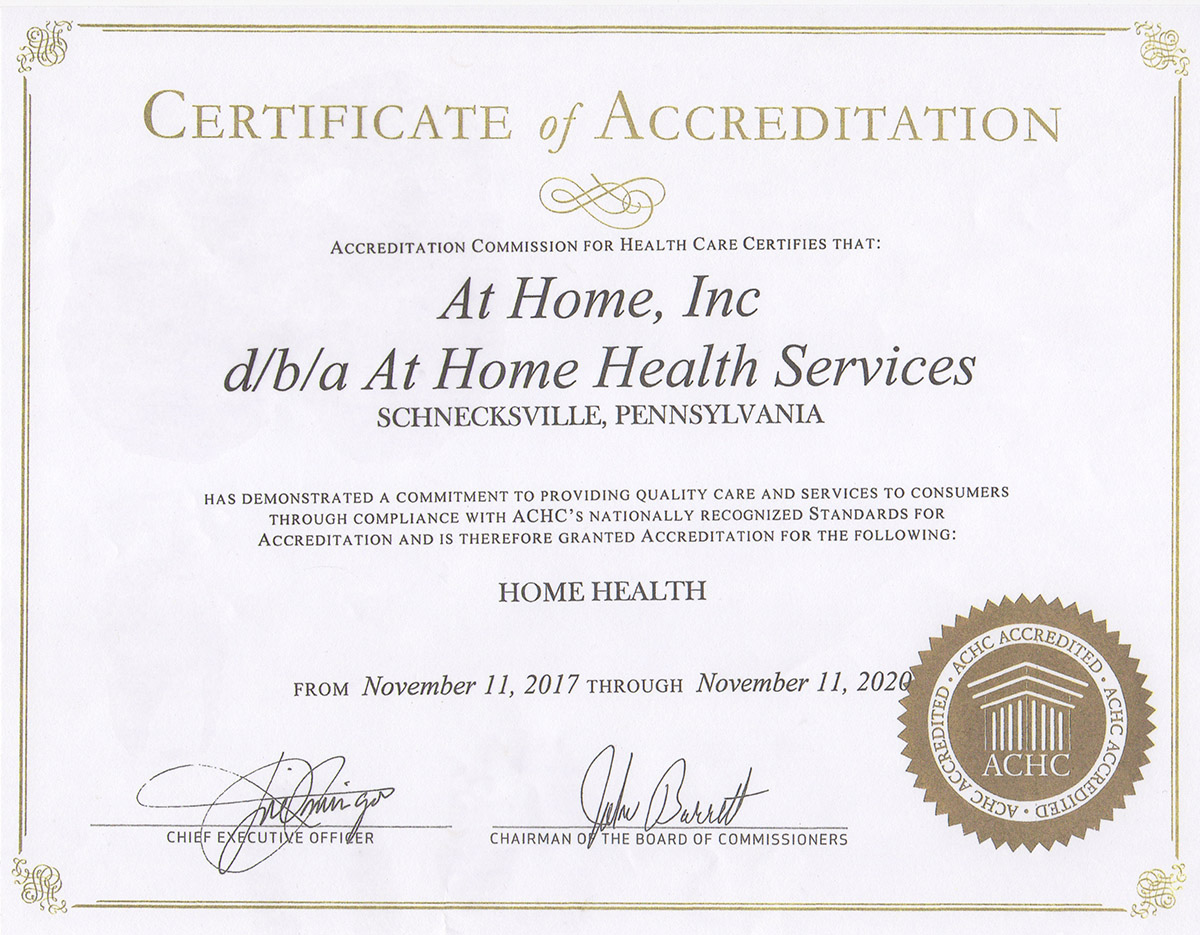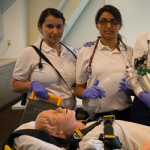What is a Home Health Aide?
When a loved one gets ill or too old to care for themselves anymore, their family may want a Home Health Aide instead of putting that family member into the hospital.
A Home Health Aide is a link between the medical team and the patient, to ensure that they are being taken care of and getting the medical attention necessary.
As a Home Health Aide, you will have many tasks to complete, including changing bed linens, making meals, bathing patients, as well as keeping them entertained and happy.
Sometimes, this career can be 9-5, but often it is more than that.
Duties
In order to be a success in this career, you must have knowledge of the medical profession and be a people-person.
As a Home Health Aide, you will work in people’s homes where they need to feel safe and cared for.
Some of the daily challenges of a Home Health Aide include:
- Helping with meals
- Showering patients
- Distributing medication
- Speaking with family members and medical staff
- Keep patient company
Salary
Working as a Home Health Aide is considered an entry-level career in the medical field.
The average salary for a Home Health Aide in the United States is about $29,430 a year.
Having an education can raise that salary to $37,010 a year in some areas.
States like Virginia and Alaska boast higher salaries for their Home Health Aides, at over $33,000 a year.
However, working in a state like Texas could mean your salary is closer to $22,290 a year.
The best way to gain the highest salary in this career is to earn certifications and gain hands-on experience.
Annually National Average Salary: $33,380
Average Annual Salary by State
| State | Avg. Annual Salary |
|---|---|
| Alabama | $24,690 |
| Alaska | $38,540 |
| Arizona | $33,590 |
| Arkansas | $28,050 |
| California | $35,220 |
| Colorado | $37,510 |
| Connecticut | $37,630 |
| Delaware | $30,930 |
| District of Columbia | $37,190 |
| Florida | $31,370 |
| Georgia | $28,760 |
| Hawaii | $35,100 |
| Idaho | $31,000 |
| Illinois | $35,270 |
| Indiana | $31,070 |
| Iowa | $34,740 |
| Kansas | $28,430 |
| Kentucky | $32,740 |
| Louisiana | $22,460 |
| Maine | $36,750 |
| Maryland | $35,140 |
| Massachusetts | $38,550 |
| Michigan | $31,750 |
| Minnesota | $34,620 |
| Mississippi | $24,210 |
| Missouri | $30,270 |
| Montana | $31,600 |
| Nebraska | $32,960 |
| Nevada | $32,630 |
| New Hampshire | $34,800 |
| New Jersey | $36,470 |
| New Mexico | $28,330 |
| New York | $38,280 |
| North Carolina | $29,180 |
| North Dakota | $38,190 |
| Ohio | $30,320 |
| Oklahoma | $26,310 |
| Oregon | $40,060 |
| Pennsylvania | $30,580 |
| Rhode Island | $38,760 |
| South Carolina | $28,420 |
| South Dakota | $35,190 |
| Tennessee | $29,800 |
| Texas | $23,850 |
| Utah | $35,470 |
| Vermont | $35,160 |
| Virginia | $29,500 |
| Washington | $42,000 |
| West Virginia | $26,400 |
| Wisconsin | $32,030 |
| Wyoming | $34,530 |
| Guam | $23,390 |
| Puerto Rico | $20,500 |
| Virgin Islands | $29,430 |
Annual Average Salary: Top 5 States
The top earning state in the field is Washington, where the average salary is $42,000.
These are the top 5 earning states in the field:
* Employment conditions in your area may vary.
Home to Become a Home Health Aide
Step 1 Enroll in a Program
There are several types of programs that someone interested in becoming a Home Health Aide can enroll in.
Online programs can be as short as 8 weeks, or up to one year.
It’s possible to find in-person programs at local community colleges, as well as universities across the United States.
If you want more education, you could even enroll in an Associate’s degree program, which can take around two years to finish.
Some of the types of courses that you can expect in a Home Health Aide program include:
- Human Development
- Clinical Theory
- Developmental Needs
- Biology
- Ethics and Confidentiality
Although there are many programs online, most that require an internship or externship will also require that to be in person instead of online.
Step 2 Gain Experience
After earning a certificate or an Associate’s degree, it’s time to start gaining some experience as a Home Health Aide.
If you were required to work an internship or externship through your program, then you should know the intricacies of the career already.
There are some people who go into this career with no experience at all, and the best way to gain that experience is to shadow a senior Home Health Aide.
You can do this by contacting your local hospital or Home Health Aide company in your area.
Having experience in this field is key to success, hands-on knowledge will provide you with many more opportunities down the line.
Step 3 Become Certified
It’s not legally required to become certified as a Home Health Aide in most states, but it is still something that every Home Health Aide should consider.
Having a certification will show employers and patients that you know what you are doing as a Home Health Aide.
Those with certifications tend to gain employment faster than Home Health Aides with no credentials.
The National Association of Home Care and Hospice is a great accredited organization to find certification as a Home Health Aide.
In order to be eligible for this credential, you must meet the following requirements:
- Adherence to the NAHC Code of Ethics
- Pay the application fee
- Have application approved
- Take certification exam
- Five years of experience
- 24 months of consecutive employment
This exam consists of 223 multiple choice questions and is timed at three hours.
To take the exam, a $50 fee is required.
Step 4 Further Your Education
Now that you are certified, you may want to think about furthering your career as a Home Health Aide.
This can be done in many different ways, including gaining promotions or earning a raise.
It’s possible to earn a Bachelor’s degree in a medical field to enhance this career as well.
Some people decide that they would like to look at other careers in the same field.
These careers can include:
- Medical Assistant
- Childcare
- Nursing home staff
You could even start your own Home Health Aide business, or become the supervisor at an established company.
Working as a Home Health Aide is considered an entry-level career in the medical field, and will provide the chance to gain knowledge in medicine.
Popular Programs
Education
To work as a Home Health Aide, you do not have to have a certain degree or certificate legally, however most employers do suggest having one.
Gaining employment will be easier for Home Health Aides who have shown they are knowledgeable in the field.
Programs can be online or in-person at local community colleges or universities.
Depending on the program you choose to enroll in, there may be a required internship or externship to complete before graduation.
For people with an interest in earning an Associate’s degree, it’s possible to major in a medical field and to find employment as a Home Health Aide.
There may be a necessity to meet certain qualifications to enroll in a Home Health Aide program.
These requirements could include:
- Passing a physical examination
- Taking a state-mandated blood test
- Passing a background check
Some of the types of subjects you can expect to learn in a Home Health Aide program are:
- Taking vitals
- How to control infectious diseases
- Managing patients
- Health-related services
- Client assessment
Programs can be done online or in person, but make sure that all internships or clinical studies are done in-person to gain maximum hands-on experience.
Often with a Home Health Aide program, students will earn a CPR certification while earning their Home Health Aide certificate or Associate’s degree.
If you are interested in earning an Associate’s degree, there are options to choose from when thinking about majors.
Some of the most popular majors for Home Health Aides are:
- Healthcare administration
- Medical assisting
- Applied science
- Life science
Even though it is not legally required to earn an Associate’s degree, there are many employers that only hire workers with credentials.
This is to ensure that the Home Health Aide has proper knowledge of the career, and will know what to do if an emergency or medical situation were to arise.
Video About The Career
Certification
Just like the education for a Home Health Aide, having a certification is not legally required, but it is important in this career.
Those who have a certification as a Home Health Aide, or other certification in the medical field, will likely find employment faster than someone with no credentials.
Certification as a Home Health Aide can be done through the National Association for Home Care and Hospice.
This agency provides the Certified Home Health Aide credential.
In order to be eligible for this certification, you must have five years of experience as a Home Health Aide, 24 months of that being consecutive.
For those with a Bachelor’s degree or higher, the required time in the field is only 2-3 years instead of five.
The enrollment fee to take the exam associated with this certification is $50, or $20 for members of the NAHC.
The exam has 223 questions that are all multiple choice, and prospective Certified Home Health Aides can expect to have 3 hours to finish the exam.
There is no way to retest for this exam, so studying is key.
Also, there is no scoring on this exam, takers will either pass or fail.
The topics to study for this exam include:
- Management of care
- Developmental planning
- Legal and regulatory issues
- Quality and risk management
- Public relations and marketing
- Ethics
Some certifications through your state or local agencies can also be obtained.
These certifications can help when taking care of patients with Medicaid or Medicare.
The American Caregiver Association has a certification for Home Health Aides which is called the National Caregiver Certification.
This credential can be obtained by new Home Health Aides and seasoned Home Health Aides.
In order to gain this certification, you must attend the program.
Some of the topics covered in this program include:
- Basic supervision
- Personal care
- Behavior management
- Disability care
The course costs $99 and can be done online.
Certification Example:

Average Training Program Duration: 0-1 Year
Most programs to work as a Home Health Aide take about six months to complete.
This includes an internship or externship so that the Home Health Aide can learn hands-on experience while still enrolled in the program.
Some online programs can be as little as 6 weeks but beware of ones that are this short as they may skip out on a lot of necessary information.
The average certification program takes about 6 weeks to complete as well, depending on the association you apply with.
Job Outlook
There are many more people looking for home care rather than staying in the hospital, racking up bills.
Due to the increase of this desire, as well as the aging baby boomer population, which will require more medical care, this career shows a growth of 33 percent over the next decade.
That is almost double the percentage of other careers in the medical field, which means this career is here to stay.
In fact, it’s becoming the preferred way to seek medical care in the United States.
Other factors leading to the increase in job opportunities for Home Health Aides are advancements in technology and the older generation retiring from the workforce.
Employment Growth Projection: 33%
2020
2030
That's a higher than average projected growth of 1,129,900
Should You Become a Home Health Aide?
Overall Satisfaction: Medium

This career can be stressful at times, due to the fact that you are working with people who have illnesses or not capable of doing things on their own.
A Home Health Aide may have to work strange hours, which can lead to an unbalanced work/home life.
Other factors that make this career less than stellar is the low paying salary for the amount of work necessary, and the fact that it’s not necessary to earn a degree to work as a Home Health Aide.
Those who work for themselves as a Home Health Aide, or who have certifications will likely have more career success and satisfaction.
Average Salary: Medium

The average Home Health Aide in the United States will make around $29,430 a year.
However, with certifications, education, and many years of experience, a Home Health Aide can make over $37,010 a year in some areas.
Working in areas with large populations of elderly people will create higher salaries.
Those who are just beginning their career as Home Health Aides will see a salary closer to $22,290 or less.
The top-earning state for Home Health Aides in Alaska, where they can make nearly $35,000 a year.
Job Growth Outlook: High

If you are looking to become a Home Health Aide, now is the perfect time to get started.
This career is looking to jump 33 percent over the next decade.
The reason for this rise in demand for Home Health Aides is the rising costs of medical care in hospitals.
People who are responsible for the sick or elderly are finding it harder to pay medical expenses.
Having a Home Health Aide can be a cost-effective alternative.
The rising elderly population is another factor in this growth, the baby boomer generation is aging, which means the necessity for more medical care.
Education Duration: 0-1 Year

Even though it is not legally required to become trained as a Home Health Aide, if you plan to work for an employer, especially one who takes Medicaid or Medicare insurance, you will need some type of education.
There are community colleges and universities across the United States that have programs for Home Health Aides.
Online programs to become a Home Health Aide can take as little as six weeks to finish, but others can be as long as a year.
Some Home Health Aides even earn an Associate’s degree in a medical field in order to gain more career opportunities as a Home Health Aide.
Personal Skills Needed

It can be a tough job working as a Home Health Aide, so it’s important to have a certain set of skills to be successful.
Of course, you must know basic medical knowledge and have an understanding of your patients diagnosis, but you must also have these skills in order to work as a Home Health Aide:
- Good ethics and morals
- Communication skills
- Great bedside manner
- Attention to detail
- Organization skills
- Sense of urgency
- Stamina
- Physical strength
- Reliability
- Honestly and integrity
- Sense of humor
- Punctuality
Frequently Asked Questions
What is the average salary for Home Health Aides?
In the United States, working as a Home Health Aide can pay around $29,430 a year on average.
At the beginning of your career as a Home Health Aide, it is likely that you will make closer to $22,290 to start.
Then, after several years of experience, certification, and further education, it’s possible to make as much as $37,010 a year in this career.
Expect to have a higher salary in larger populations, especially those with a large elderly population.
How long does it take to become a Home Health Aide?
If you are interested in working as a Home Health Aide, you could start right now.
However, that doesn’t mean you will be a big success in the career.
To become a good Home Health Aide, it should take around 6 months to gain the knowledge necessary.
Whether you work through a program or gain experience through shadowing another Home Health Aide, learning medical terminology and working with an agency will help you in this career.
What does a Home Health Aide do?
A Home Health Aide is someone who takes care of those who are sick or unable to take care of themselves any longer.
This can be done by changing bed linens, cleaning the home, cooking meals, distributing medication, among other things.
A Home Health Aide is the link between the patient, their family, and the medical team working with them.
It may be necessary to provide emotional support to the family and the patient as well.
What is the demand for Home Health Aides?
In the next ten years, the increase in career opportunities for Home Health Aides will skyrocket.
At 33 percent, this career will grow much more than many other jobs in the same field.
The reason for this growth is the fact that many families do not want to leave their loved ones in the hospital.
Instead, they choose to bring them home and have someone be their caretaker when they cannot be around.
This, paired with the fact that the baby boomer generation is becoming elderly, means that there will be no shortage of Home Health Aide jobs in the near future.
How much does it cost to become a Home Health Aide?
Working as a Home Health Aide can cost nothing, but if you want to enter a program, it can cost a bit more.
The average Home Health Aide program costs around $500 to complete.
If you earn an Associate’s degree for this career, that can cost around $15,000, depending on the school attended.
It can take anywhere between $0-$15,000 to become a Home Health Aide.
 Home Health Aide Info by State
Home Health Aide Info by State

- Alabama
- Alaska
- Arizona
- Arkansas
- California
- Colorado
- Connecticut
- Delaware
- Florida
- Georgia
- Hawaii
- Idaho
- Illinois
- Indiana
- Iowa
- Kansas
- Kentucky
- Louisiana
- Maine
- Maryland
- Massachusetts
- Michigan
- Minnesota
- Mississippi
- Missouri
- Montana
- Nebraska
- Nevada
- New Hampshire
- New Jersey
- New Mexico
- New York
- North Carolina
- North Dakota
- Ohio
- Oklahoma
- Oregon
- Pennsylvania
- Rhode Island
- South Carolina
- South Dakota
- Tennessee
- Texas
- Utah
- Vermont
- Virginia
- Washington
- West Virginia
- Wisconsin
- Wyoming
Home Health Aide Resources
- 14 Pros and Cons of Being a Home Health Aide
- CPR Certification for HHAs
- Differences Between a CNA and HHA
- HHA Gear
- Home Health Aide Job Description
- How Much Does Home Health Aide School Cost?
- How to Get Home Health Aide Training
- How to Obtain a Home Health Aide Certificate
- Jobs for Home Health Aides
- Online Home Health Aide Training Programs
- The Top Qualities of a Successful HHA
- Typical Home Health Aide Duties
- What is a Certified Medication Aide?
- What to Expect Taking Home Health Aide Classes
- Where Can the HHA Field Lead Me To?
- Where to Find Home Health Aide Jobs
More Medical Careers
| Career | |
|---|---|
 | Certified Nursing Assistant Working as a Certified Nursing Assistant is an entry-level role that will give you hands-on experience when you are ready to take the next step in your medical career. |
 | Dental Assistant Dental assistants help dentists to provide patient care, keep records, and care for the dental equipment. |
 | Dental Hygienist Dental hygienists take care of cleaning teeth to promote hygiene and help avoid cavities and gum problems. |
 | Dialysis Technician Dialysis technicians maintain and monitor dialysis equipment, and also act as primary caregivers for patients undergoing dialysis treatment. |
 | Dog Groomer Dog groomers attend to grooming dogs, usually at dog salons or big pet-related chain stores. |
 | Healthcare Administrator Healthcare administrators – also known as healthcare executives or health services managers – are responsible for the planning, direction, and coordination of medical and health services. |
 | Licensed Practical Nurse (LPN) Licensed Practical Nurses provide basic nursing care to patients and work with Registered Nurses and Doctors. |
 | Medical Assistant Medical assistants support the work of physicians, nurses, and other health professionals. |
 | Medical Biller and Coder Medical billers and coders manage, organize, and code various health information data. |
 | Medical Technologist Medical laboratory technologists collect bodily samples and conduct tests to analyze those samples. |
 | Medical Transcriptionist Medical transcriptionists go over voice recordings to convert them into written texts. |
 | Nutritionist As a Nutritionist, you’ll be tasked with creating meal plans, counseling, and understanding dietary restrictions for all types of clients. |
 | Patient Access Representative The work involves helping people to orient themselves to the space and everything that is going on. |
 | Patient Care Technician Patient care techs work directly with patients helping them with daily activities and assist the medical staff by measuring and monitoring the patients' vital signs among other tasks. |
 | Pharmacy Technician Pharmacy technicians provide patients with medications through prescription or over the counter. |
 | Phlebotomist As a Phlebotomist, it will be your responsibility to take blood samples from patients and send them to the lab for further testing. |
 | Physical Therapist Assistant Physical therapist assistants provide physical therapy services to patients and aide to physical therapists. |
 | Professional Recovery Coach A professional recovery coach is a life coach who works with someone during their addiction recovery process. |
 | Radiation Therapist Allied health provisional who specializes in radiation oncology treatments. |
 | Registered Health Information Technician Registered Health Information Technician (RHIT) help store and verify accuracy of health records as well as analyze patient data. |
 | Registered Nurse (RN) Registered Nurses provide hands-on patient care in various settings, mainly hospitals, and clinics. |
 | Respiratory Therapist Respiratory therapists treat and care for patients who experience breathing difficulties. |
 | Sterile Processing Technician A sterile processing technician is a healthcare professional who is responsible for preparing, sterilizing, maintaining, packaging, and storing medical tools and equipment used in surgical and other medical procedures. |
 | Surgical Technologist Surgical technologists – also known as operating room techs – prepare operating rooms and assist doctors and nurses during surgical procedures. |
 | Vet Office Manager Veterinary office managers work to make sure that the daily operations run smoothly and efficiently at veterinary hospitals or veterinary clinics. |
 | Veterinary Assistant Veterinary Assistants work closely with Veterinarians to handle routine animal care. |
 | Veterinary Technician Veterinary Technicians assist veterinarians as well as diagnosing and treating animals, mostly in private clinics. |
 | EKG Technician EKG technicians test and monitor the cardiovascular system. |
 | EMT Trained emergency medical technician that arrives at the scene to provide medical services such as resuscitation. |
 | MRI Technologist MRI Technologists use a machine to scan the body and create a detailed image of the inside for doctors to analyze. |
 | Optician Opticians are technicians and salespersons at the same time who spends most of their day talking to customers, reading prescriptions written by doctors, and dispensing glasses and lenses. |
 | Ultrasound Technician Ultrasound technicians aid physicians in monitoring and diagnosing patients through the use of ultrasonic imaging technology. |
 | X-Ray Technician X-Ray Technicians are medical imaging professionals who use technology to visualize the inside of our bodies. |














